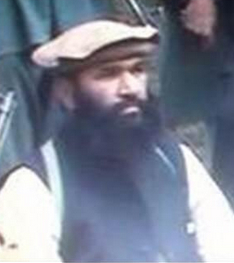
|
| Noor Qasim Sabari, the shadow governor for Kunar province, from a Taliban video released in 2012. |
The Afghan Taliban confirmed that its shadow governors for Kunar and Kandahar provinces were killed during combat over the past month.
The Taliban noted the deaths of Noor Qasim Sabari (or Noor Qasim Hayderi) and Abdul Wasi' Azzam, the shadow governors of Kunar and Kandahar respectively, in a statement that was released on April 22 on Voice of Jihad, the group's official website. Sabari and Azzam were described as the "Jihadi in-charge" of their provinces.
Sabari was killed "in a cowardly enemy airstrike in Kunar," the Taliban stated, without releasing further detained. The National Directorate of Security, Afghanistan's domestic intelligence service, claimed that the Sabari and several senior commanders were killed in an airstrike that targeted "a gathering of the senior Pakistani and Afghan Taliban leaders." [See LWJ report, Taliban's shadow governor for Kunar reported killed in US airstrike.]
Also reported killed in the strike that killed Sabari were Qari Osman, the shadow district governor for Shigal; Qari Nasir Gajar, the chief suicide attack coordinator; Mullah Bashir Gajar, the IED coordinator; Qari Sherin, an assassination squad leader; and senior commanders Qari Zubair, Qari Latif, and Qari Tari. Their deaths have not been confirmed.
Azzam, the shadow governor of Kandahar, was "martyred in a firefight with enemy forces in Gerimsir [Garmsir] district of Helmand."
Both leaders served in the Taliban over the span of three decades, according to the Taliban statement.
"The mentioned martyrs played important roles in Jihadi services throughout the country during the previous Jihad [likely a reference to the Taliban's takeover of Afghanistan in the early 1990s], at the time of rule of the Islamic Emirate and during the harsh conditions of the current Jihad against the invading crusaders," the Taliban said.
Airstrikes such as the one that killed Sabari in Kunar may become much more difficult for the US to execute as the drawdown continues. The Obama administration is seriously considering a force of less than 10,000 and possibly fewer than 5,000 troops stationed in Afghanistan after the end of 2014.
US military officials said that a small force would focus on securing its own base or bases, but that the reduced size would hinder the execution of counterterrorism operations and robust air operations against the Taliban and al Qaeda, which still maintain a presence in the country.